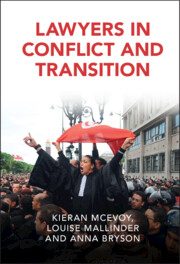Book contents
- Lawyers in Conflict and Transition
- Cambridge Studies in Law and Society
- Lawyers in Conflict and Transition
- Copyright page
- Dedication
- Epigraph
- Contents
- Acknowledgements
- Abbreviations
- Chapter 1 Lawyers in Conflict and Transition
- Chapter 2 Cause Lawyers, Political Violence, and Professionalism in Conflict
- Chapter 3 Boycott, Resistance, and the Law
- Chapter 4 Gender and Cause Lawyering in Conflicted, Authoritarian, and Transitional Societies
- Chapter 5 Government Lawyers in Conflict, Repression, and Transition
- Chapter 6 Lawyers in Transitional Political Negotiations
- Chapter 7 Lawyers, Transitional Justice, and Dealing with the Past
- Chapter 8 Conclusion
- Appendices
- Bibliography
- Index
- Cambridge Studies in Law and Society
Chapter 8 - Conclusion
Published online by Cambridge University Press: 17 March 2022
- Lawyers in Conflict and Transition
- Cambridge Studies in Law and Society
- Lawyers in Conflict and Transition
- Copyright page
- Dedication
- Epigraph
- Contents
- Acknowledgements
- Abbreviations
- Chapter 1 Lawyers in Conflict and Transition
- Chapter 2 Cause Lawyers, Political Violence, and Professionalism in Conflict
- Chapter 3 Boycott, Resistance, and the Law
- Chapter 4 Gender and Cause Lawyering in Conflicted, Authoritarian, and Transitional Societies
- Chapter 5 Government Lawyers in Conflict, Repression, and Transition
- Chapter 6 Lawyers in Transitional Political Negotiations
- Chapter 7 Lawyers, Transitional Justice, and Dealing with the Past
- Chapter 8 Conclusion
- Appendices
- Bibliography
- Index
- Cambridge Studies in Law and Society
Summary
The concluding chapter draws together the core themes of the book in light of the broader literature on conflict, authoritarianism, transitional justice, cause lawyering, and the broader sociology of law and the legal profession. In particular, we revisit the themes of exceptionalism, agency/resistance, legitimacy, and memory to illuminate the tools, tactics, and strategies that lawyers resort to when professional boundaries, ethics, and norms are compromised. In all of the sites under review, engaging in legal work that challenged the prevailing political regime required moral and political commitment and often entailed significant personal risk and sacrifice.
- Type
- Chapter
- Information
- Lawyers in Conflict and Transition , pp. 298 - 314Publisher: Cambridge University PressPrint publication year: 2022

